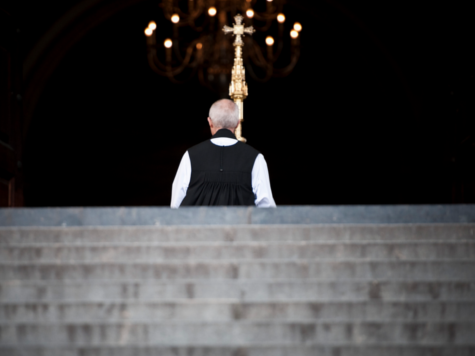What The Guardian and its writers appear to understand about the Christian Church could be written on the back of a postage stamp – with space to spare.
Proof positive comes in the form of Andrew Brown’s absurd piece entitled “Christian conservatism takes radical position against welfare cuts”. In a clumsy attempt to ally ‘Christian conservatism’ – in other words, the non-liberal element of the Church – in the paper’s campaign vilifying government welfare reforms, Brown alleges his triumphal chief point: “There is no connection at all between right-wing economic views and theological conservatism”.
The only problem with that is that Brown’s lightweight assessment has more holes in it than the road in Blackburn. By way of my credentials let me say that a couple of years ago, as a theological conservative, I wrote a book which set out to survey the landscape of Christian conservatism.
Among the top contenders for liberalism-at-large in the Anglican Church is the Anglican House of Bishops, a hotbed of woolly liberalism if ever there was one. Strike one against Brown’s assertion. He even cites the “evangelical HTB movement” (that is, Holy Trinity Brompton groups of churches) as supporting his position.
But, as my book The Great Evangelical Disaster: Revisited makes abundantly clear, HTB is part of the cult-like charismatic church movement which believes the Bible per se is insufficient as the complete Word of God, and new revelation is still available to the Church. For the ‘Christian conservative’ that is simply liberalism by the backdoor.
Genuine Christian conservatives like myself have long known that real Christian conservatives are inspired by God’s Word and tend to be drawn to working at the ‘coal-face’. Thus the bulk of Christian conservatives are quitely doing ‘God’s work’ as the leaders of local churches and as members of those churches. Bizarely, it is something Brown himself acknowledges in passing – something which fully makes out my case here. He says this:
So let me summarise what ought to be Brown’s obvious conclusion. The bulk of Christians, especially those in the local churches, where ‘Christian conservatism’ flourishes generally, actually fully support the government’s efforts to reform a broken welfare systemt that encourages dependency.
Opposition, on the other hand, is largely coming from those who have chosen the path of church hierarchical leadership; a leadership, especially in the Anglican Church, known for its radical liberalism and not its “Christian conservatism”.
On key issues where Bible teaching is quite clear, including gay marriage and women bishops, Archbishop Justin Welby has has left it to the Roman Catholic Church to make public pronouncements in tune with Christian conservative orthodoxy while he chose not to speak out at all, thus avoiding controversy. Instead Welby chose the easy option of personal loans on which to wax forth. It seems that taking the chair at Lambeth, always a tricky political move within a ‘broad church’ like the Church of England, has a decidedly ‘liberalising’ effect on the theologising of once strong “Christian conservatives”.
The reality is then that far from “Christian conservatism” and Christians generally being against the proposed welfare reforms, Christian conservatives and Christians generally are actually for those reforms.
Far from being “no connection at all between right-wing economic views and theological conservatism”, it turns out that on an even cursory review of his own evidence the very reverse of what Brown contends is the case. Nothing new, however, in The Guardian using sleight-of-hand and shoddy journalism to stand reality on its decidedly liberal head.

COMMENTS
Please let us know if you're having issues with commenting.